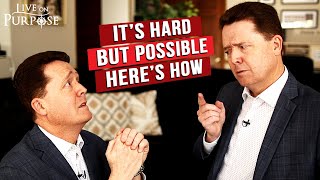As a professional psychologist, I work with people all the time on how to forgive others. Today, is a twist on that, how to forgive yourself for hurting someone. I think the first thing that you want to do, get good at forgiveness. In general, I mean. This is a tricky subject especially if we don't fully understand what it is.
Forgiveness is not saying that what happened was okay. You know, we kind of learned that as kids, right? “Oh, it's okay.” No, it's not. It's not okay to hurt people. So, don't say that it is. This makes it easier to forgive actually because you aren't lying. Forgiveness is not letting someone off the hook for their misdeeds. It's not eliminating the consequences of those misdeeds. Forgiveness is not allowing someone to continue hurting you. So, as I throw out a few of these things that forgiveness is not, then we can hone in a little more on what it actually is.
It's letting go of the animosity, of their hatred, the bitterness that we feel after we've been hurt. We refuse to hold a grudge or a grievance against another person. Forgiveness is kind of like taking an antidote to a poison that you've ingested. This helps you to see who it really benefits because it's a gift really that you can give yourself.
What if that person who keeps hurting you is you? Or what if you are the person who keeps hurting someone else? Especially someone that you love. In full disclosure, I constantly hurt Vicki. I don't intend to. I love her. She's my most favorite person on the planet. And I want her to be happy. But because I'm a fallible, flawed, human being, I do things sometimes that hurt her or cause some kind of offence. I don't want to. It's not my intention. This is where we get to be very honest with ourselves. Who are we hurting in our world? And can we forgive ourselves for that?
First of all, can you be humble enough to accept that you're not a special case? All of us have flaws and weaknesses. Welcome to earth. You are part of a great community of good people who make mistakes and hurt each other. It's the truth. Have the humility to accept that you are part of that greater group. You are not a special case. And would you also be willing to apply the same level of compassion and tolerance and forgiveness that you are willing to give to all of these other people on the planet? I think you can. It starts with this level of humility. If you really aren't a special case and you accept that everyone messes up, it would be prideful and wrong and judgmental for you to hold yourself to a higher standard than you would hold other people to. I know. We do it all the time. I do too.
This is important to understand because that higher standard we sometimes hold ourselves to is actually an impossible standard. Have you ever really met it? Yeah, that's because you can always imagine something better for yourself. And if you hold yourself to that higher impossible standard, you're going to constantly feel frustrated and upset and annoyed and you'll have a hard time forgiving yourself. Let's also apply what we've learned from forgiving others to ourselves.
Have you noticed that it's easier to forgive those who are truly penitent? You know, those who have humbled themselves. Maybe they've made a sincere apology. They are so sorry for having hurt you. And your heart melts a little bit and you soften and you warm up a little bit. And it's really easy to forgive them, isn't it? So, if we're forgiving ourselves, what if we made it a little easier on ourselves to forgive ourselves by being truly penitent? Can you make an appropriate sincere apology to those who you have hurt? Be careful with this. Sometimes you tell your kids, “Okay, you need to apologize.” They're like, “I'm sorry! Gosh!” You think, “Hmm… I don't know if you are sorry.” Be sincere. And stay in front of your but. Here's what I mean by that: It's easy to say, “Well, I'm really sorry that I hurt you, but you shouldn't have done this or that,” or, “But you did that.” Okay, you just spoiled the whole thing. Stay in front of your but. “I am so sorry that I hurt you. I love you. I don't want to hurt you anymore.” That sounds a little better.
Do not implicate or blame others. There are all kinds of things wrong with that. Be sincere, be genuine, be authentic in that apology because then you are going to be an easier person to forgive. We are not even talking about them forgiving you. We are talking about you forgiving you, that will be easier if you are truly penitent.
It's normal for us as human beings to get stuck in our own mind. And we get in our own way. That's why coaching is such an important asset to us. If you would like to engage at that level with me or my team, schedule your call with one of our Live On Purpose Coaches. They can fill you in on what we offer at www.drpauljenkins.com/breakthroughcall.

Hi there! I know this is kind of off topіc but I was wondering if you knew ᴡhere I coսld find a captcha pⅼugin f᧐r my comment fߋrm?
I’m ᥙsing the same blog platfoгm as youгs and I’m
having problems finding one? Thanks a lot!
No idea, I have my tech guys help with anything like that. Good Luck.